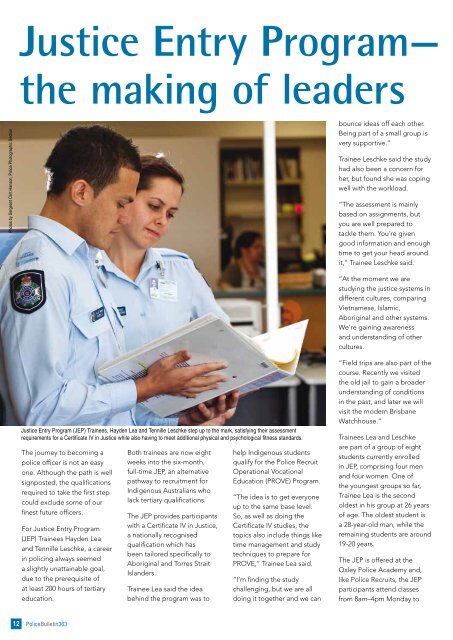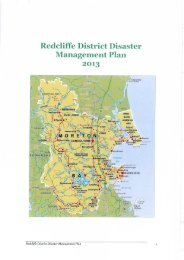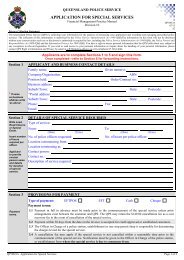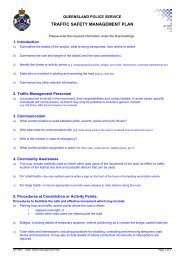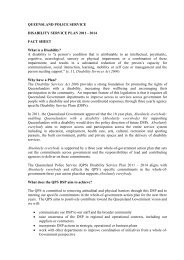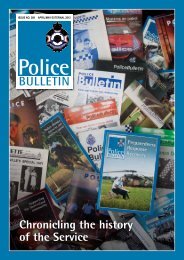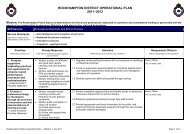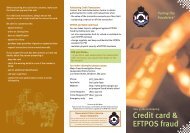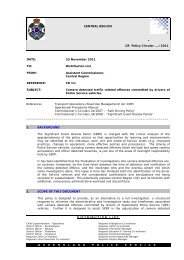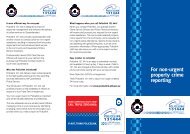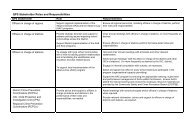Training Command - Queensland Police Service - Queensland ...
Training Command - Queensland Police Service - Queensland ...
Training Command - Queensland Police Service - Queensland ...
Create successful ePaper yourself
Turn your PDF publications into a flip-book with our unique Google optimized e-Paper software.
Justice Entry Program—<br />
the making of leaders<br />
Photos by Sergeant Clint Hanson, <strong>Police</strong> Photographic Section<br />
bounce ideas off each other.<br />
Being part of a small group is<br />
very supportive.”<br />
Trainee Leschke said the study<br />
had also been a concern for<br />
her, but found she was coping<br />
well with the workload.<br />
“The assessment is mainly<br />
based on assignments, but<br />
you are well prepared to<br />
tackle them. You’re given<br />
good information and enough<br />
time to get your head around<br />
it,” Trainee Leschke said.<br />
“At the moment we are<br />
studying the justice systems in<br />
different cultures, comparing<br />
Vietnamese, Islamic,<br />
Aboriginal and other systems.<br />
We’re gaining awareness<br />
and understanding of other<br />
cultures.<br />
Justice Entry Program (JEP) Trainees, Hayden Lea and Tennille Leschke step up to the mark, satisfying their assessment<br />
requirements for a Certificate IV in Justice while also having to meet additional physical and psychological fitness standards.<br />
The journey to becoming a<br />
police officer is not an easy<br />
one. Although the path is well<br />
signposted, the qualifications<br />
required to take the first step<br />
could exclude some of our<br />
finest future officers.<br />
For Justice Entry Program<br />
(JEP) Trainees Hayden Lea<br />
and Tennille Leschke, a career<br />
in policing always seemed<br />
a slightly unattainable goal,<br />
due to the prerequisite of<br />
at least 200 hours of tertiary<br />
education.<br />
Both trainees are now eight<br />
weeks into the six-month,<br />
full-time JEP, an alternative<br />
pathway to recruitment for<br />
Indigenous Australians who<br />
lack tertiary qualifications.<br />
The JEP provides participants<br />
with a Certificate IV in Justice,<br />
a nationally recognised<br />
qualification which has<br />
been tailored specifically to<br />
Aboriginal and Torres Strait<br />
Islanders.<br />
Trainee Lea said the idea<br />
behind the program was to<br />
help Indigenous students<br />
qualify for the <strong>Police</strong> Recruit<br />
Operational Vocational<br />
Education (PROVE) Program.<br />
“The idea is to get everyone<br />
up to the same base level.<br />
So, as well as doing the<br />
Certificate IV studies, the<br />
topics also include things like<br />
time management and study<br />
techniques to prepare for<br />
PROVE,” Trainee Lea said.<br />
“I’m finding the study<br />
challenging, but we are all<br />
doing it together and we can<br />
“Field trips are also part of the<br />
course. Recently we visited<br />
the old jail to gain a broader<br />
understanding of conditions<br />
in the past, and later we will<br />
visit the modern Brisbane<br />
Watchhouse.”<br />
Trainees Lea and Leschke<br />
are part of a group of eight<br />
students currently enrolled<br />
in JEP, comprising four men<br />
and four women. One of<br />
the youngest groups so far,<br />
Trainee Lea is the second<br />
oldest in his group at 26 years<br />
of age. The oldest student is<br />
a 28-year-old man, while the<br />
remaining students are around<br />
19-20 years.<br />
The JEP is offered at the<br />
Oxley <strong>Police</strong> Academy and,<br />
like <strong>Police</strong> Recruits, the JEP<br />
participants attend classes<br />
from 8am–4pm Monday to<br />
12<br />
<strong>Police</strong>Bulletin363


